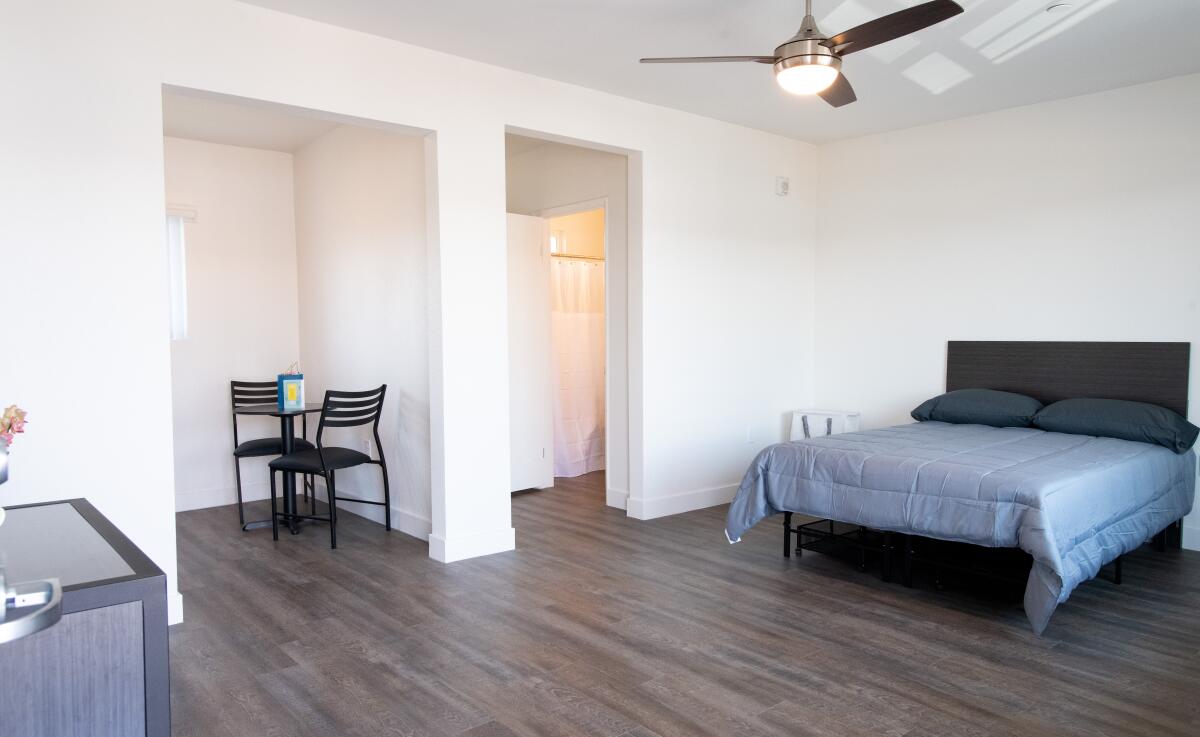The Newport Beach City Council on Tuesday signed off on a $3-million loan to help transform a former Travelodge in Costa Mesa into supportive housing for homeless people and at-risk individuals.
Nonprofit American Family Housing will convert the aging motel at 1400 Bristol St. into 78 units of housing. The property will be purchased by the county of Orange and leased to the developer.
A majority of the money for the project, roughly $29 million, came from state funds made available through the Project Homekey program. The county provided $6.8 million, Costa Mesa contributed $4 million and, in addition to the $3 million coming from Newport Beach, the developer also took out a separate private loan for over $3.1 million.
The city’s loan to AFH is on a 55-year term with a simple 3% interest rate. In exchange for that support, up to 12 units will be set aside for homeless and extremely low income tenants referred to the supportive housing development from Newport Beach.
Units in the new housing complex will be fully furnished studios with kitchenettes and ADA accessible. Amenities will include a community kitchen and two laundry rooms, as well as indoor and outdoor gathering spaces. Support services to help tenants reach housing stability will also be available on site.

A studio apartment at Clara Vista in Stanton, which was converted from a motel under Project Homekey.
(Eric Licas)
The City Council voted 7-0 to move forward with the loan. However, Councilwoman Lauren Kleiman voiced concern over certain aspects of the deal. She and Councilwoman Robyn Grant will meet with city staff in hope of “finalizing and ironing out the last details of the agreement,” Kleiman said.
“I’m generally in support of the project moving forward,” she said during the meeting. “But particularly, in light of lessons learned from our Costa Mesa Bridge Shelter partnership, I have a lot of questions and concerns about the terms of this agreement and in particular the practical application of our local priority and how that will interplay with our comprehensive approach to homelessness and affordable housing.”
Newport Beach teamed up with Costa Mesa to fund the 88-bed Bridge Shelter, and currently has 25 spots reserved at that facility. It typically operates at or near capacity.
A count conducted Nov. 21 by People Assisting the Homeless, an organization contracted to perform outreach for Newport Beach, found as few as 11 people living on the street or in cars in the city. A similar census done around the same time last year identified as many as 70. Last year’s count was run by City Net, which is no longer contracted by Newport Beach.
In August the city also cut ties with Be Well, the nonprofit that had been operating a mobile mental health response team for them since 2021. That nonprofit recently lost its position as the operator of Orange County’s Mental Health and Wellness Campus in Orange, and has come under scrutiny for entering into a $275,000 contract with a friend of embattled County Supervisor Andrew Do for services that were never delivered, as reported by LAist.
City’s homeless management
Newport Beach shifted to a strategy placing a greater emphasis on its police department and a recently bolstered anti-camping ordinance to compel people living on the street into shelter and support services. That change came in light of a U.S. Supreme Court decision that allows municipalities to enforce such laws and public calls from Gov. Gavin Newsom to clear encampments.
“Newport Beach’s anti-camping laws are clearly having a positive effect in moving people off the streets,” outgoing Mayor Will O’Neill said in a statement last month. “The new ordinance is prompting more unhoused individuals to accept shelter and services as an alternative to citations or arrest.”
Between Oct. 10 and Nov. 19, Newport Beach police arrested 58 people and issued 10 citations to people while responding to 154 calls involving homeless people, city officials said in a news release.
Critics of a law enforcement-based approach to homelessness say it criminalizes those most severely impacted by a nationwide housing crisis, and maintain that wrapping people up in the criminal justice system adds additional barriers to getting off of the street. Many advocates for homeless people urge communities to prioritize building housing while developing a network of mental health, substance abuse, training and other services to address the underlying issues that keep people from reaching housing security.
Kleiman joined her City Council colleagues when they voted unanimously in August to hire more police to handle calls involving homeless people. But in an email to the Daily Pilot Thursday, she acknowledged that “housing navigation can be challenging for these vulnerable populations, so permanent supportive housing is a critical component to a comprehensive program. My interest is ensuring best practices for the management of the project and the seamless transition of individuals into the right type of housing and support for their needs.”
